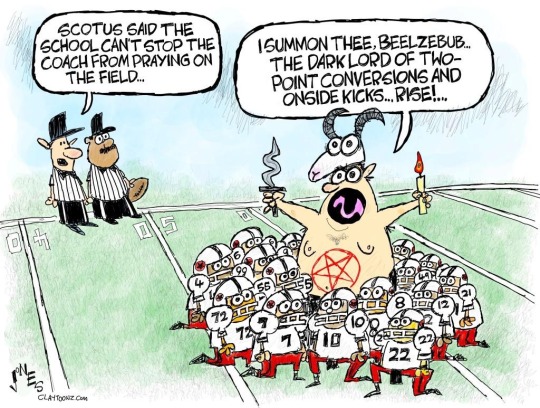#KENNEDY v. BREMERTON SCHOOL DISTRICT
Text
On Thursday, Justice Neil Gorsuch released a 26-page opinion venting outrage about a legal dispute that does not exist, involving websites that do not exist. Yet this case, built on imaginary grounds, will have very real consequences for LGBTQ consumers, and for anti-discrimination laws more broadly. All of the Court’s Republican appointees joined Gorsuch’s opinion in 303 Creative v. Elenis.
That said, the fake dispute that Gorsuch imagines in his 303 Creative opinion involves a reasonably narrow legal question.
In the past, Christian right advocates have sought sweeping exemptions from state and federal civil rights laws, rooted in their expansive notion of “religious liberty.” Often, these lawsuits claimed that the Constitution’s safeguards for people of faith allow anyone who objects to LGBTQ people on religious grounds to defy any law prohibiting anti-LGBTQ discrimination.
303 Creative involves a much narrower dispute. The case centers on Lorie Smith, a website designer who wishes to expand her business into designing wedding websites — something she has never done before. She says she’s reluctant to do so, however, because she fears that if she designs such a website for an opposite-sex couple, Colorado’s anti-discrimination law will compel her to also design wedding websites for same-sex couples. And Smith objects to same-sex marriages.
As Gorsuch summarizes her claim, Smith “worries that, if she [starts designing wedding websites,] Colorado will force her to express views with which she disagrees.”
This is not a religious liberty claim, it is a free speech claim, rooted in well-established law, which says that the First Amendment forbids the government from compelling people to say something that they would rather not say. In ruling in Smith’s favor, the Court does not say that any religious conservative can defy any anti-discrimination law. It simply holds that someone like Smith, who publishes words for a living, may refuse to say something they don’t want to say.
The full implications of Gorsuch’s opinion are not entirely clear. In the past, religious conservatives have argued that artists and artisans of all kinds — including bakers, photographers, and floral arrangement designers — should also be allowed to discriminate under the First Amendment, because all artistic work necessarily entails some kind of expression. Gorsuch punts on this question, writing that “hypotheticals about photographers, stationers, and others, asking if they too provide expressive services covered by the First Amendment,” are not present in the 303 Creative case.
And it is worth emphasizing that the particular kind of work that Smith does, writing words on a publicly available website, fits more snugly within the First Amendment than a similar claim brought by a wedding cake designer or a florist.
Before this case was argued, I wrote that if Lorie Smith had been approached by a same-sex couple and refused to design a wedding website for them, and if she had then been sued for refusing to do so, then she would have a very strong First Amendment defense against such a suit. As the Supreme Court said in Rumsfeld v. Forum for Academic and Institutional Rights (2006), “freedom of speech prohibits the government from telling people what they must say.” And that includes the right of a web designer to refuse to write words on a website that they do not wish to write.
But none of these events have actually happened. And, for that reason, the Supreme Court should have dismissed the case.
THIS CASE SHOULD HAVE NEVER MADE IT THIS FAR
The frustrating thing about this case is that it involves an entirely fabricated legal dispute. Again, Lorie Smith has never actually made a wedding website for a paying customer. Nor has Colorado ever attempted to enforce its civil rights law against Ms. Smith. Indeed, in its brief to the Supreme Court, Colorado expressed doubt that its anti-discrimination law would even apply to Smith.
Yet Gorsuch’s majority opinion repeatedly paints Smith as a hapless victim, oppressed by wicked state officials who insist that she must proclaim a dogma that she denies. As he writes in the very first paragraph of his opinion, “Colorado does not just seek to ensure the sale of goods or services on equal terms. It seeks to use its law to compel an individual to create speech she does not believe.”
This claim is simply untrue. Colorado has not brought any enforcement action against Smith, or taken any other step to compel her to say anything at all — or to design any website that she does not want to design. Nor has anyone ever sued Smith for allegedly violating Colorado’s anti-discrimination law.
Indeed, in one particularly amusing turn, Smith alleged during an early stage of this litigation that she was approached by a man about doing some design work for his wedding to another man. Yet, after the New Republic’s Melissa Gira Grant contacted this man, she learned that he never reached out to Smith — and that he was married to a woman.
These facts matter because federal courts, including the Supreme Court, do not have jurisdiction to decide hypothetical cases. As a unanimous Supreme Court held in Texas v. United States (1998), “a claim is not ripe for adjudication if it rests upon ‘contingent future events that may not occur as anticipated, or indeed may not occur at all.’” So the Court should have told Smith to go away and come back when she had a real dispute with the state of Colorado.
303 Creative, moreover, is the second time Gorsuch has taken such liberties with the truth in order to rule in favor of a religious conservative. Almost exactly one year ago, Gorsuch handed down the Court’s decision in Kennedy v. Bremerton School District (2022), a case about a public school football coach who, after games, would walk to the center of the 50-yard line and ostentatiously kneel down and pray before students and spectators — often while surrounded by players, community members, and even members of the press.
Indeed, in her dissent in Bremerton, Justice Sonia Sotomayor included a photo of Coach Kennedy holding such a prayer session, as a throng of uniformed football players and other individuals kneel with him, and as people holding video cameras look on.
And yet, Gorsuch’s opinion in Bremerton claimed that Kennedy merely wanted to offer a “short, private, personal prayer,” and then Gorsuch ruled in favor of Kennedy based on this fabricated version of Kennedy’s actual conduct.
Needless to say, this is aberrant behavior by a Supreme Court Justice — and really by six Supreme Court justices, since all of the Court’s Republican appointees joined Gorsuch’s decisions in 303 Creative and Kennedy.
#us politics#news#vox#2023#us supreme court#SCOTUS#303 Creative v. Elenis#republicans#conservatives#justice neil gorsuch#religious liberty#republican homophobia#anti lgbtq discrimination#lgbtqia+ rights#lgbtqia+#Lorie Smith#Rumsfeld v. Forum for Academic and Institutional Rights#Texas v. United States#Kennedy v. Bremerton School District#justice sonia sotomayor
151 notes
·
View notes
Text

#us politics#2022#political cartoons#art#drawings#clay jones#separation of church and state#us supreme court#scotus#football#high school#prayer#religious freedom#public schools#1st amendment#first amendment#KENNEDY v. BREMERTON SCHOOL DISTRICT#satanists
232 notes
·
View notes
Photo
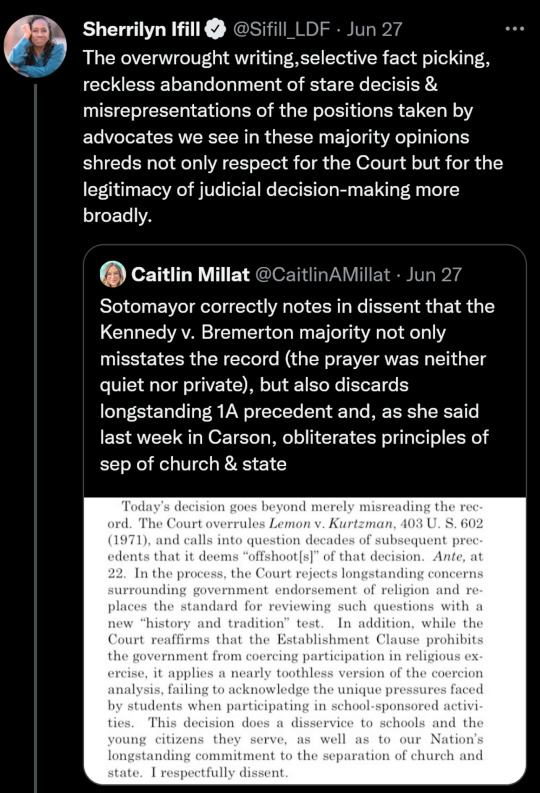
(source)
#truth be told#sherrilyn ifill#news#kennedy v. bremerton school district#kennedy vs bremerton#us supreme court#separation of church and state
0 notes
Text
Do kids today have a prayer?
Do kids today have a prayer?
God only knows!
After the horror of Uvalde TX and, here in Madison, cafeteria brawls, 12-year-olds stealing cars, and teenage shoot-em-ups, this headline in this morning’s Wall Street Journal seems almost quaint:
“Supreme Court rules coach can pray on field after game.”
Is America great, or what!
The administrators of the coach’s Bremerton WA school district are standard-issue School of Education…

View On WordPress
0 notes
Text
Da Snark MUST Be Shared!
Da Snark MUST Be Shared!
Ever notice how in certain weather, your head and chest just seem to fill with ‘stuff’ and you sneeze, wheeze, gasp and cough until you think surely you’ve coughed up a lung? Well, in certain political climes, my head just fills to the gills with snark, and there’s only one way to alleviate the symptoms … share it!
You could’a knocked me over with a feather …
Yesterday was a red-letter day in…

View On WordPress
#Josh Hawley#Kennedy v Bremerton School District#NATO#religious liberty#Ryan Kelley#U.S. Senate#U.S. Supreme Court
0 notes
Text
Leaving the Mess for Later
One thing that's come up in a few of the Supreme Court's recent blockbuster decisions is the shakiness of the fact pattern in the underlying case. Mr. Kennedy in Kennedy v. Bremerton School District wasn't really just an average citizen whose desire to privately pray on his own was stymied by the evil liberal school district. Ms. Smith of 303 Creative v. Elenis might have outright falsified documents suggesting that a gay couple asked to engage her services. The Supreme Court's conservative majority did not care, blitzing ahead in decisions that made dramatic alterations to major areas of constitutional law doctrine.
At one level, I actually understand the perspective here. When it comes to abstract, "philosophical" question regarding the scope of the Establishment Clause or whether anti-discrimination law must sometimes yield to free speech commitments, the details of the individual case don't really matter. If it wasn't Kennedy, it'd be someone else. If what you care about is the broad, sweeping change -- interring Lemon v. Kurtzman for good, or laying a marker that public accommodations laws must yield to businesses right to "expressively" discriminate -- the details don't affect the underlying arguments all that much. The same claims and counterclaims that would be made in any case would be aired here. 303 Creative probably already felt like the can that was kicked down the road from Masterpiece Cakeshop. Similar impatience was seen in some of the concurrences in Fulton v. City of Philadelphia -- we know we're going to have to decide whether to revisit Employment Division of Oregon v. Smith, and we know the arguments for and against preserving the precedent, so why delay the inevitable? Just make the decision one way or the other and get it done.
At another level, though, this speaks to how the current conservative judicial cadre really doesn't care about the formalities of law and legal doctrine. It's movement conservatism through and through -- the important thing is the bottom-line results, and the Court will shoot first and let others clean up the mess later. This especially stood out for me in 303 Creative, a case where it was striking how much more legalistic Justice Sotomayor's dissent was compared to Justice Gorsuch's majority opinion. The former, whether one agrees with the result or not, worked through the relevant First Amendment doctrine via the same methodology I'd teach my students -- explaining the relevant doctrinal framework, explaining why this case falls into a particular part of the framework, and explaining the implications thereof. The majority opinion was basically an abstract ode to the importance of free expression but skipped past significant swaths of the seemingly essential legal analysis (often by vague gestures at party "stipulations" or just treating as gospel certain holdings of the Tenth Circuit). It was hard to escape the sense that the nitty-gritty details of Lorie Smith's case were not at all what interested the majority, and so they were disinclined to spend significant time on them. They wanted to make a big statement about the interplay of free speech and anti-discrimination law, so that's where they devoted their attention.
From that vantage, the fact that Lorie Smith's case may not have been the cleanest vehicle isn't really all that important. Of course, from the vantage of lower courts trying to figure out what the hell 303 Creative actually means, it's extremely important, because nobody actually knows the concrete rule that 303 Creative is actually establishing, and the blurry fact pattern means that trying to infer it from Lorie Smith's situation is a doomed initiative. But again, that's someone else's mess to deal with. I honestly believe that the Justices in the 303 Creative majority did not care if Lorie Smith, personally, deserves the exemption from anti-discrimination law under the doctrine that will eventually lay out. What they cared about is being decisive in defending the existing of these exemptions in concept. Lorie Smith just had the good fortune to be the next case in line that could be plucked onto the docket.
I've written before of the Machiavellian character of the current Supreme Court, specifically, it's absorption of Machiavelli's advice to tyrants: that they should take their big oppressive swings early, in full force, and all at once. You won't gain any advantage from dragging things out, and you'll probably get credit if you cut back later. And the repeated pattern we've seen is of the Court taking these huge right-wing swings that delight conservatives on the level of ideology, but without much care for how they can be operationalized as a workable legal doctrine, and leaving it lower courts to clean up its mess. And to give an inch of silver lining, there is the chance (this follows from Machiavelli too) that as that "mess" resolves itself the Court will then quietly file down some of the roughest edges. The Bruen decision, which reads as a right-wing ideological fantasy document but which has unleashed utter chaos in lower courts, may be an example if the Court uses the Rahimi case to cut back the most extreme interpretations. Take the big swing, make the chest-out assertion of insisting that no amount of public necessity can weigh against robo-originalism, and then later on at their discretion maybe pick and choose a few morsels to dial back on and claw back some legitimacy.
But nonetheless, it really is striking the degree to which the conservative legal movement just no longer cares that much about the law. As a law professor, it makes for depressing teaching. As a citizen, it makes for depressing living. Just depression all around.
via The Debate Link https://ift.tt/03PY6Qg
75 notes
·
View notes
Text
Forgot To Post This Yesterday
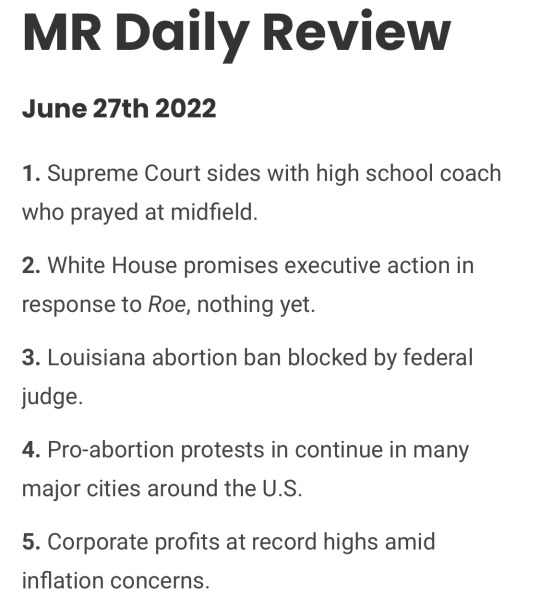
1. Supreme Court sides with high school coach who prayed at midfield.
The Supreme Court further eroded the separation of church and state in a ruling released Monday. The case Kennedy v. Bremerton School District focused on whether it was a violation of the constitution for a high school football coach to lead a team prayer at the 50 yard-line after games. In a 6-3 ruling the court held the school district violated his free speech and free exercise rights. This case is yet another mask off example of the world conservative justices are trying to build and once again significantly alters decades of precedent.
2. White House promises executive action in response to Roe, nothing yet.
The White House reportedly has a slew of executive actions planned aimed at bolstering abortion rights following the overturning of Roe v. Wade. There is a lot the administration could do from opening abortion clinics on federal lands to making funds available through Health and Human Services for people needing to travel to seek abortions. Those two things specifically are not anticipated and it’s unclear what exactly is to come. It is clear though with 50+ days to prepare for this moment there is no excuse for not having everything ready to go on day one.
3. Louisiana abortion ban blocked by federal judge.
Abortion providers in Louisiana sued the state for an injunction on their “trigger law” outlawing abortions immediately, claiming it was unconstitutionally vague. Judge Robin M. Giarrusso approved the injunction and set a hearing for July 8th. In the mean time abortion will remain technically legal in Louisiana with the final result pending the results of that July 8th hearing.
4. Pro-abortion protests in continue in many major cities around the U.S.
On Friday and over the weekend millions of people took to the streets in cities and towns all across the country. Outside the Supreme Court there were dueling groups of advocates, some protesting the right to abortion being stripped away, others celebrating the outcome. For decades abortion has been a fundamental issue to the conservative grassroots and activism, driving people to act and vote. Demonstrations have made it abundantly clear removing the right is creating a similar driving force amongst liberals and the left.
5. Corporate profits at record highs amid inflation concerns.
There are a lot of reasons given for current inflationary trends but one thing that doesn’t come up enough is pure corporate greed. From supply chain issues to rising fuel costs, corporations have all sorts of excuses lined up to justify raising prices. If it were a matter of corporations being forced into price hikes that would be one thing, but in reality these price hikes are fueling record profits, none of which are going back to workers. Inflation is being used to fear monger anti-worker policies, but it’s 100% created by capital.
Podcast - Sunday Streams - Instagram - Twitter - Discord
Support it all by joining us on patreon.
34 notes
·
View notes
Text
A group of House Democrats called for legislation on Monday that would add four seats to the Supreme Court, lamenting a “ultra right-wing” branch that just overturned the Roe v. Wade decision on abortion rights.
The eight lawmakers cited recent Supreme Court decisions that rolled back Miranda rights, threw out a New York gun control law and allowed religion to surface in schools — as well as the Dobbs v. Jackson Women’s Health decision that overturned the right to abortion in Roe — in saying there was a need to add new Justices to the Court.
Rep. Hank Johnson (D-Ga.), the lead sponsor of the 2021 Judiciary Act, called the current makeup “a Supreme Court at crisis with itself and with our democracy” where “basic freedoms are under assault” from the 6-3 conservative supermajority on the bench.
The Supreme Court isn’t susceptible to the popular vote the way Congress is, Johnson said, and it has used that fact to amass power. “It’s making decisions that usurp the power of the legislative and executive branches,” he said.
Facing Republican opposition and some Democratic skepticism, the bill has little chance of becoming law, but it illustrates the deep anger among Progressive Democrats about the Court's direction under three conservative Justices nominated by former-President Trump: Neil Gorsuch, Brett Kavanaugh and Amy Coney Barrett.
Those three Justices have radically altered the direction of the Court, which now has twice as many conservative Justices as liberal ones. Kavanaugh replaced Justice Anthony Kennedy, a previous swing vote who had been nominated to the court by a Republican, while Barrett replaced liberal Justice Ruth Bader Ginsburg.
Adding to Democratic anger, a GOP Senate blocked former-President Obama’s last nominee to the court, Merrick Garland, who is now the Attorney General. Gorsuch ended up being nominated to the court in place of Garland.
Introduced last year, the Judiciary Act has not progressed in Congress.
Some Democrats wary of the proposal are concerned that expansion would open the court up for Republicans to push more of their nominees into the openings.
“The nightmare scenario of GOP court-packing is already upon us,” said Rep. Mondaire Jones (D-N.Y.). “That’s how they got this far-right 6-3 majority in the first place.”
Lawmakers at Monday’s press conference, hosted by the Take Back the Court Action Fund, blamed Trump and the conservative legal movement for enabling a partisan court.
Republican politicians made controlling the judicial branch part of their platform, said Rep. Mark Takano (D-Calif.), adding that the court has “gone rogue” and “become a radical institution.”
The lawmakers also emphasized that the longevity of the lifelong terms the sitting Justices are now serving makes action to expand the court more urgent.
Of 72-year-old conservative Justice Samuel Alito, Johnson said, “You can see the gleam in his eye as he thinks about what he wants to do to decimate the rights of people and put us back in the Dark Ages.”
Trump-nominated Gorsuch, Barrett and Kavanaugh, in their 50s, are “gonna be there for a while,” Johnson said.
Congress has changed the number of seats on the nation’s highest court seven times in the nation’s history. The new proposal would bring the total seat count to 13, meaning a decision from the court would need a 7-6 majority rather than the present 5-4.
Reps. Andy Levin (D-Mich.), Jan Schakowsky (D-Ill.), Bonnie Watson Coleman (D-N.J.), Rashida Tlaib (D-Mich.) and Sheila Jackson Lee (D-Texas) were also at the conference, along with Sen. Ed Markey (D-Mass.), who sponsored the bill in the Senate, and a handful of progressive activists.
#us politics#news#the hill#2022#us supreme court#scotus#Vega v. Tekoh#kennedy v. bremerton school district#New York State Rifle & Pistol Association Inc. V. Bruen#dobbs v. jackson women’s health organization#miranda rights#concealed carry#gun rights#separation of church and state#prayer in schools#Rep. Hank Johnson#2021 Judiciary Act#Judiciary Act#justice neil gorsuch#justice brett kavanaugh#justice amy coney barrett#Rep. Mondaire Jones#Take Back the Court Action Fund#Rep. Mark Takano#rep. Andy Levin#rep. Jan Schakowsky#rep. Bonnie Watson Coleman#rep. rashida tlaib#rep. Sheila Jackson Lee#Sen. Ed Markey
71 notes
·
View notes
Text
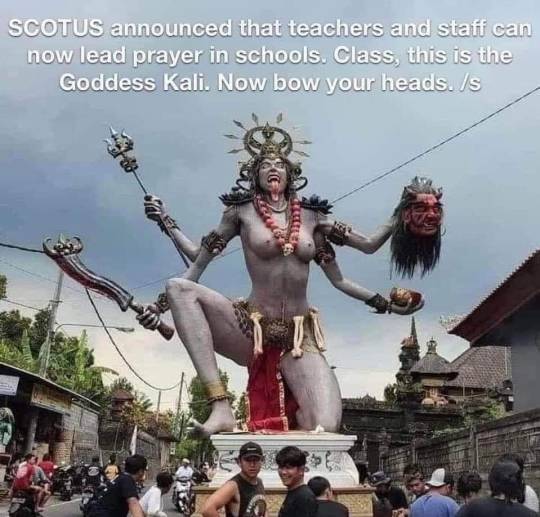
#us politics#scotus#us supreme court#separation of church and state#organized religion#religious freedom#public schools#prayer#kali#hindu religion#Hinduism#2022#memes#KENNEDY V. BREMERTON SCHOOL DISTRICT
138 notes
·
View notes
Text
WASHINGTON -- The Supreme Court on Monday ruled that the First Amendment protects a public school coach's right to pray near students.
The case focusing on separation of church and state involved a high school football coach praying post-game at the 50-yard line, joined by his players.
The court held that the Free Exercise and Free Speech Clauses of the First Amendment protect an individual engaging in a personal religious observance from government reprisal; the Constitution neither mandates nor permits the government to suppress such religious expression.
Justice Neil Gorsuch authored the opinion. The vote was 6-3.
"Both the Free Exercise and Free Speech Clauses of the First Amendment protect expressions like Mr. Kennedy's," Gorsuch wrote. "Nor does a proper understanding of the Amendment's Establishment Clause require the government to single out private religious speech for special disfavor. The Constitution and the best of our traditions counsel mutual respect and tolerance, not censorship and suppression, for religious and nonreligious views alike."
Justice Sonia Sotomayor dissented, joined by Justice Stephen Breyer and Elana Kagan.
In her dissent, Sotomayor introduced the case as being "about whether a public school must permit a school official to kneel, bow his head, and say a prayer at the center of a school event," and wrote, "The Constitution does not authorize, let alone require, public schools to embrace this conduct."
She said the free exercise clause serves as "a promise from our government" while the establishment clause serves as a "backstop that disables our government from breaking it" and "start[ing] us down the path to the past, when [the right to free exercise] was routinely abridged."
"It elevates one individual's interest in personal religious exercise, in the exact time and place of that individual's choosing, over society's interest in protecting the separation between church and state, eroding the protections for religious liberty for all," she wrote.
Chief Justice John Roberts, Justice Clarence Thomas, Justice Samuel Alito and Justice Amy Coney Barrett joined the majority opinion in its entirety.
The ruling in Kennedy v. Bremerton School District is a win for former high school football coach Joe Kennedy, who was suspended from his job in 2015 over post-game prayers on the 50-yard line that sometimes involved his players.
Kennedy insisted the midfield prayers were brief, private individual acts of faith. The school district argued that student participation breached constitutional prohibitions against promotion of religion by government officials.
"It was my covenant between me and God that after every game, win or lose, I'm going to do it right there on the field of battle," Kennedy told ABC News of his ritual, which he said typically lasted less than a minute.
"This is a right for everybody. It doesn't matter if you're this religion or that religion or have no faith whatsoever," he said. "Everybody has the same rights in America."
Lower courts had sided with the school district. A Supreme Court reversal in favor of Kennedy could soon expand the ability of government employees nationwide to practice their faiths more openly while on the job, legal experts say.
The First Amendment protects free speech and free exercise of religion, but it also prohibits the establishment of religion by the government.
The Supreme Court has long said that public school-sponsored prayer violates the Establishment Clause, even if the prayer is voluntary.
At the same time, the court has ruled that free speech rights don't end at the schoolhouse gate and that religion need not be entirely expunged from public schools.
While Kennedy routinely prayed on the field after games for more than seven years, attracting varying levels of participation from students, it wasn't until 2015 that the school district informed the coach of constitutional concerns.
"They just said if anybody could see you anywhere here, it was over," Kennedy said.
The school district explained at the time in a statement that the prayers violated "constitutionally-required directives that he refrain from engaging in overt, public religious displays on the football field while on duty."
Some parents complained that the prayer sessions were applying inappropriate pressure on students to participate, even if unintended.
"The coach is a leader. The coach is a mentor. If he goes to the 50-yard line, he has a message he wants to deliver, and so the players would follow," said Bremerton parent Paul Peterson, whose son Aaron played for coach Kennedy in 2010.
"The harm is to those who are the minority students, the minority faiths, the students who have no faith," he said. "They are being pressured into doing something that they don't fundamentally agree with. That's what the First Amendment protects us from."
A federal appeals court called Kennedy's characterization of his prayers as brief, quiet and solitary as a "deceitful narrative," noting that they were clearly audible prayers surrounded by groups of students, amounting to unlawful religious speech as "a school official."
Kennedy's case has been cheered on by top Republicans, including former President Donald Trump, dozens of state and federal lawmakers, and star NFL quarterbacks, like Kirk Cousins and Nick Foles, who told the justices in a friend-of-the-court filing that the power of prayer promotes good sportsmanship.
The school district has had broad backing in court filings from other professional athletes, members of Congress, civil rights groups, teachers unions, and local government groups, including the U.S. Conference of Mayors.
Kennedy currently lives in Florida but told the court that he would move back to Bremerton to return to coaching, if the justices ruled in his favor.
21 notes
·
View notes
Text
The US Supreme Court Shit is Real Bad Y'all
Okay
Okay look
I know I keep harping on this with like every US Supreme Court update post I reblog but please.
Please.
I need y'all to understand this shit's real fucking bad.
Right now our tally in terms of SC rulings is at:
-Dismantles the precedent that protects indigenous sovereignty (which paves the way to destroy the protections of the Indian Child Welfare Act) (Done on June 29, 2022) Oklahoma v. Castro-Huerta
Repealing of Roe v Wade (which has led to 13 states enacting trigger bans on abortion, two of which--Louisiana and Kentucky, are being held back by the courts) (Done June 24, 2022) Dobbs v. Jackson Women’s Health Organization
Severely limiting the Miranda rights by saying that a police officer cannot be sued if they fail to read someone their Miranda rights (ie "you have the right to remain silent") and then uses information that person shares against them in court (Done on June 23, 2022)
Overturned the precedent of separation of church and state in Kennedy v Bremerton School District by ruling in favor of a coach who led a Christian prayer on the football field (Done on June 27, 2022)
Restricted the EPA's power to limit carbon emissions from power plants. (Done on June 30, 2022) West Virginia v. Environmental Protection Agency
Ruled that people can carry handguns outside the home, without special reason. (Done June 23, 2022) New York State Rifle & Pistol Assoc. v. Bruen.
Ruled that private religious schools cannot be barred from accessing public funding, further damaging separation of Church and State (Done June 23, 2022) Carson v. Makin
Ruled that those who were detained and tortured in Guantanamo Bay do not have the right to ask details about their torture from the agents that committed the acts, or from the US Government (Done March 3, 2022) United States v. Zubaydah
The Conservative Bloc on the Supreme Court currently holds an egregious amount of power, and is using that power to rapidly dismantle a lot of "settled law" AKA shit that has longstanding precedents from prior court decisions.
This behavior is generally considered a dick move in terms of legal shit, but is also a massive red flag. I'm particularly wigged out because 7 of these 8 decisions have happened this month.
While it isn't unheard of for the court to pass a lot of rulings in a short time, the extreme nature of these rulings and the hard line most of them have between conservative and liberal justices indicates a rapid grab for power here.
Congress can do a number of things around this:
Suck the power out of these upturnings by codifying shit like Roe v Wade into law.
Expanding the Supreme Court (which has been done before) to balance the current lopsidedness of the court.
Impeach the four Supreme Court justices who've lied during their consideration hearings.
Pull an Abraham Lincoln and refuse to recognize the legitimacy of the court rulings
This isn't a complete list, but one meant to point out that while a branch of federal government is off the fucking rails, that does not mean there is nothing to be done--or that we should accept apathy from our representatives.
Shit to do:
Call/email your representatives demanding they do all or one of the above and stop asking your ass for money
Write a letter to the editor of a local paper publicly calling your representative to do shit since that's what their job is
Plug into mutual aid networks, around abortion, bail funds, and legal aid among the basic needs. The government's not going to save us, but community safety nets are in place.
Get a VPN and use it. Check out digital security and what it means when apps track your data.
Figure out where you might fit into activism. Movement work isn't just protests. It's child care, it's hotline networks and food programs, and clothing drives. It's support groups.
Get your oxygen mask on first. If your basic needs are not being met, if you aren't getting time for rest and pleasure and care then you're not going to be able to show up for long haul sustained work. Do what you need to stabilize and give yourself time before jumping into shit.
This is in no way a complete list, instead it's meant to be something you can grab onto if like me you're reeling with the barrage of frightening rulings and rapid escalation from the US government.
All is not lost. The US has been a fascist mess invested in the exploitation of vulnerable people for far longer than this (you know, since it's founding, really).
But there is power in community and grassroots movements have been working for decades to catch people who fall through the cracks of government support systems. Find them.
Be each other's hope in the storm.
#US Supreme Court#Fascism#conservatism#mutual aid#oohhh things are bad bad bad#but we can fucking do something
18 notes
·
View notes
Link
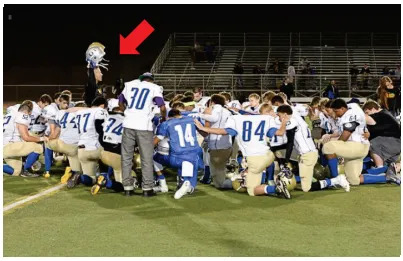
Here is an example of the “quiet, private prayer.”
13 notes
·
View notes
Text
The fear of offending the Constitution's establishment clause does not, Gorsuch writes, require the government "to single out private religious speech for special disfavor. The Constitution and the best of our traditions counsel mutual respect and tolerance, not censorship and suppression, for religious and nonreligious views alike."
Re: the majority opinion in Kennedy v. Bremerton School District
13 notes
·
View notes
Text
6 notes
·
View notes
Text
Naming the single worst decision of the Supreme Court’s disgraceful 2021-22 term is a tough call. But the one that best captures the majority’s brazen efforts to inflict its political and religious agenda on the rest of the country may well be Kennedy v. Bremerton School District, which ruled that the coach had a constitutional right to pray on the field. Overturning precedent and in a cynical elision of fact, Justice Neil Gorsuch, writing for a 6-to-3 majority, affirmed Kennedy’s assertion that his proselytizing on government property during a public-school function was “private,” “personal” and “quiet.”
It was nothing of the kind. In easily observable fact, Kennedy’s religious display was public, vocal and coercive, as demonstrated by testimony from football players and other community members and by video and photographs of the coach surrounded by crowds of people on bent knee. According to an amicus brief filed by one of Kennedy’s football players and seven other members of the community on behalf of the school district, participation in Kennedy’s prayers was “expected.” Students were explicitly encouraged by him to ask the other teams’ coaches and players to join in, something Kennedy himself boasted about.
5 notes
·
View notes
